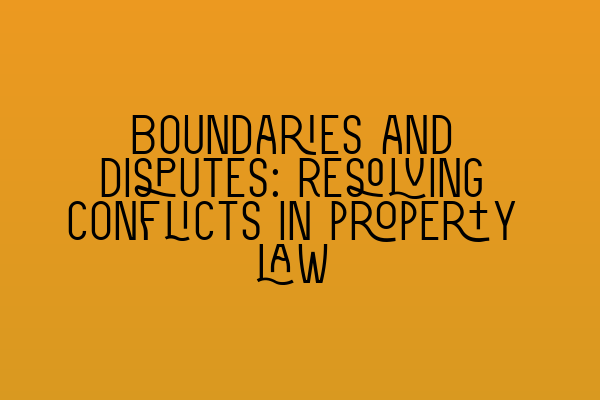Boundaries and Disputes: Resolving Conflicts in Property Law
As a property owner, it’s essential to understand the boundaries of your land and the potential conflicts that may arise. Boundary disputes can be complex and emotionally charged, but they can often be resolved through legal means. In this article, we will explore the importance of boundaries in property law and discuss how disputes can be effectively resolved.
The Significance of Boundaries
Boundaries serve as the physical demarcation of a property’s extent, providing clarity and defining the rights and responsibilities of adjacent landowners. They play a critical role in avoiding conflicts and maintaining peaceful coexistence. By clearly defining boundaries, property owners can avoid encroachments, trespassing, and other boundary-related issues.
However, boundary disputes can arise due to various reasons, such as inaccurate property descriptions, outdated surveys, adverse possession claims, or disagreements between neighbors. Resolving these conflicts promptly and effectively is crucial to protect one’s property rights and maintain good relations with neighbors.
Resolving Boundary Disputes
When facing a boundary dispute, it is crucial to approach the matter in a systematic and legal manner. Here are some steps to help you navigate the resolution process:
- Review Property Documentation: Start by reviewing your property’s title deeds, surveys, and other relevant documents to gain a thorough understanding of the boundaries. It is important to identify any discrepancies or ambiguities that may contribute to the dispute.
- Consult an Experienced Property Solicitor: Seeking legal advice from a qualified property solicitor is highly recommended. A solicitor specializing in property law can guide you through the dispute resolution process, assess the strength of your case, and represent your interests in negotiations or court proceedings if necessary.
- Mediation and Negotiation: Mediation can be an effective means of resolving boundary disputes without resorting to litigation. A neutral third party, such as a mediator, can facilitate constructive discussions between the parties involved, helping them explore possible solutions and reach a mutually satisfactory agreement. Negotiation, on the other hand, involves direct communication between the parties to find a compromise. Both methods prioritize finding a resolution that benefits all parties involved while minimizing costs and preserving relationships.
- Boundary Agreements: If the parties are able to reach a mutually acceptable resolution, it is advisable to formalize the agreement in writing through a boundary agreement. This legal document clarifies the agreed-upon boundaries, any associated easements, and any conditions or restrictions to maintain the peace between the neighboring properties.
- Court Action: If mediation and negotiation fail to resolve the dispute, court action may be necessary. In such cases, your solicitor will prepare the necessary legal documents, gather evidence, and represent your interests in court proceedings. It is important to note that court action can be time-consuming and costly, so it should be considered as a last resort.
Resolving boundary disputes can be a complex process, but by following the appropriate legal steps, it is possible to reach a satisfactory resolution.
Conclusion
Boundary disputes can be emotionally draining and financially burdensome. It is in the best interest of all parties involved to resolve these conflicts promptly and effectively. By reviewing property documentation, seeking legal advice, exploring mediation and negotiation, and, if necessary, pursuing court action, property owners can safeguard their rights and protect their investments.
If you are facing a boundary dispute or need legal assistance with any property-related matter, reach out to SQE Property Law & Land Law. Our team of experienced solicitors can provide expert advice and representation to help you navigate through complex property law issues.
For more information on SQE exams or to prepare for the Solicitors Qualifying Exam, check out the following articles:
